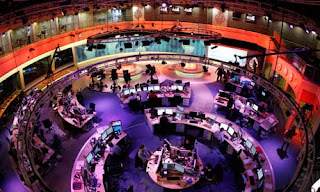Al-Jazeera's political independence questioned amid Qatar intervention
Al-Jazeera's political independence questioned amid Qatar intervention
Al-Jazeera English journalists protest after being ordered to re-edit UN report to focus on Qatar emir's comments on Syria
Al-Jazeera English newsroom in Doha, Qatar. Photograph: Fadi
Al-Assaad/Reuters
Al-Jazeera's
editorial independence has been called into question after its director of news
stepped in to ensure a speech made by Qatar's emir
to the UN led its English channel's coverage of the debate on Syrian
intervention.
Journalists had produced a package of the UN
debate, topped with excerpts of President Obama's speech, last Tuesday when a
last-minute instruction came from Salem Negm, the Qatar-based news director,
who ordered the video to be re-edited to lead with the comments from Sheikh
Hamad bin Khalifa al-Thani.
Despite protests from staff that the emir's
comments – a repetition of previous calls for Arab intervention in Syria – were
not the most important aspect of the UN debate, the two-minute video was
re-edited and Obama's speech was relegated to the end of the package.
There are hints at
staff dissatisfaction within the film, available for viewing on al-Jazeera's website and YouTube, which notes that the emir
"represents one of the smallest countries in the Arab world … but
Qatar has been one of the loudest voices condemning Syria".
The episode left a bitter taste among staff
amid complaints that this was the most heavy-handed editorial intervention at
the global broadcaster, which has long described itself as operating
independent of its Qatari ownership.
An al-Jazeera spokesman said the emir's speech
was "a significant development" that day and the broadcaster
"consequently gave it prominence".
Obama's speech had been carried live, the spokesman
added, and the emir's comments were balanced with disagreement from the
Egyptian president, Mohammed Morsi.
However, insiders said Morsi's contribution
had to be taken from an interview with another broadcaster, because none of the
world leaders speaking at the UN had, or was, intending to take notice of the
emir's comments.
Al-Jazeera English was set up in 2006 by the
Arabic broadcaster of the same name and both are owned by the Qatari state. The
network, founded in 1996, gained credibility with audiences in the region for
its seemingly independent coverage in the post 9/11 period. Its English channel
was launched to offer an alternative, non-western-centric worldview.
However, in recent years, Qatar has taken
steps to consolidate its control over the channel as the country seeks greater
political influence in the Gulf.
In September 2011, Wadah Khanfar, a
Palestinian widely seen as independent, suddenly left as director-general after
eight years in the post and was replaced by a member of the royal family,
Sheikh Ahmed bin Jassim al-Thani, a man with no background in journalism.
In his resignation letter, Khanfar said, after
noting that the channel had been criticised by Donald Rumsfeld and hailed by
Hillary Clinton, that "al-Jazeera is still independent and its integral
coverage has not changed".
He added: "When we launched in 1996,
media independence was a contradiction in terms", but al-Jazeera had
managed "to pleasantly surprise" its critics by "exceeding all
expectations".

.jpg)


تعليقات